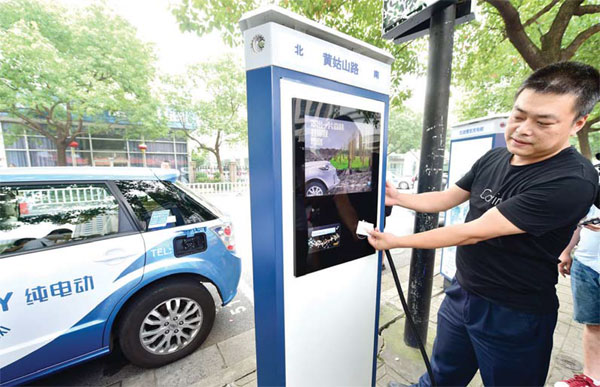Powering up new cars becomes waiting game for would-be investors

Companies that want to put money into vehicle charging stations are on standby for uniform standards
It is one thing to get the public to buy electric cars, and another to get carmakers to manufacture them and yet another to supply the power that will keep these cars on the road.
"Charging is the biggest problem for individual electric car users at the moment," says Zheng Shanjie, deputy director-general of the National Energy Administration.
| A man uses a charging post in Hangzhou, Zhejiang province. The lack of adequate charging facilities is considered a big factor hindering the development of electric cars. Li Zhong / For China Daily |
A couple of weeks ago the agency set up an alliance to promote the building of charging facilities in Changzhou, in East China's Jiangsu province, and used the occasion to sit down and talk to industry insiders about how to solve the problems they are facing.
"Now we need to adopt measures to solve these problems," Zheng says.
In Changzhou, the alliance aims to deal with matters such as standardizing charging stations and handling payments.
On Oct 8, the State Council issued a directive aimed at accelerating the construction of charging facilities that requires newly built residential properties to install the posts in their car parks or have the equipment in place to do so.
Plans are also afoot for an intercity fast charging network to cover the country's biggest cities by 2020 - when it is hoped that at least 5 million new energy vehicles will be on the road. In the first stage of this plan, construction will be promoted in Beijing, Shanghai, Guangzhou and their environs, then in regions in central, western, and northeastern China.
Speaking of what the National Energy Administration has in store in Changzhou, Chen Ning, a director and automotive consultant with Deloitte China, says: "The main thing is that all new residential property should make provision for charging posts, because eventually residents will be allowed to install their own."
The agency would issue guidelines allowing such installation and allow people to share them with others, either free or for a fee, he says.
At present, when individuals want charging posts installed, this must be done in conjunction with companies that build charging stations and with property management companies. A property manager may rule that a property's electrical capacity does not support the use of charging posts.
Among those who build the stations are three big state-owned companies, Beijing Huashang Sanyou New Energy Technology Co, Potevio New Energy Co, also of Beijing, and NARI Technology Development Co of Nanjing.
However, without government subsidies, building the stations would be unprofitable for the companies. They bid for tenders with local governments, which receive central government grants of 4,000 yuan ($630; 550 euros) for each post, Chen says.
Some companies are waiting before investing in the field, intent to see where the dust settles on uniform national standards.
Many posts now being built are based on a national standard adopted in 2012 that is not compulsory.
Most charging outlets and slots and plugs of electric and new energy vehicles are similar to ones that comply with a standard adopted in Europe, but in some of these, data transfer protocols between posts and cars vary.
"Once a communications protocol is set, those with incompatible posts may have to spend a lot of money to get their equipment to be compatible. As standards are set, more capital will flow into the sector."
Contact the writers through duxiaoying1@chinadaily.com.cn
(China Daily European Weekly 10/30/2015 page7)
Today's Top News
- Japan tempting fate if it interferes in the situation of Taiwan Strait
- Stable trade ties benefit China, US
- Experts advocate increasing scope of BRI to include soft power sectors
- New engine powers cargo drone expansion
- China to boost green industry cooperation
- Manufacturing PMI rises in November































